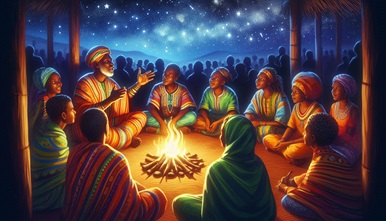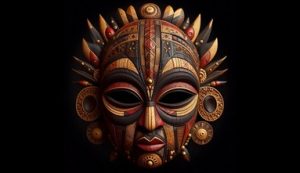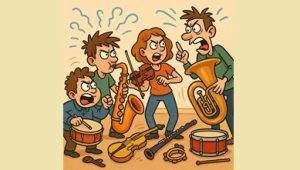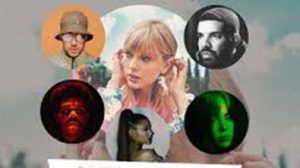African Oral Traditions: Storytelling and History
African Oral Traditions: Storytelling and History
African oral traditions constitute the majority of Africa’s culture. They help one remember his or her history, values, and beliefs.
Many years ago, before people in Africa used to write things down, they used to communicate through telling stories.
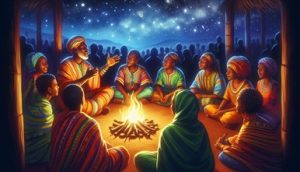
Parents told stories to their children. People kept their stories safe by utilizing songs, poems, and wise words.
Each African people has a special way of storytelling. In West Africa, some griots are storytellers.
These stories are not just fun. They also teach individuals how to behave, right from wrong, and help them recall things in the past.
Where the African Oral Tradition Comes From
African storytelling started a very long time ago—countless years! It is one of the oldest ways people used to communicate their history.
Unlike book writing, African stories were told orally. The tales were slightly different with every retelling, yet the general message was the same.
Africa’s History in Words: West Africa Oral Traditions Made Simple
Another famous group of tellers are the griots. Griots live in West Africa. They are good talkers, musicians, and historians.
They have numerous stories about kings, heroes, and families memorized. Wherever they reside, when a griot passes away, people say it is as if a whole library has been burned. That tells us how valuable their memory is.
In the ancient Mali Empire, the griots narrated the legend of Sundiata Keita, who was a young boy turned great king.
Griots not only tell stories. Spiritual leaders and elders also teach. For example, in Nigeria, Igbo elders teach children lessons in brief stories called parables.
An Igbo proverb goes: “A child who does not know the value of the village will wander without direction.” It simply indicates young people have to listen and learn from elders.
Different Types of African Oral Traditions
There are various forms of African oral traditions. They all help people to remember their heritage, gain wisdom, and be proud of the past.
- Folk Tales
These are simple tales, typically for kids. They can use animals that talk and act just like humans.
One famous character is Anansi the Spider, a wise chap who escapes being in trouble by being clever. His tales are funny and full of wisdom.
One proverb says, “Even the smallest spider can get through the biggest tree,” which means little people can do big things with cleverness.
- Myths
Myths are tales that describe how the world and nature came to exist. They frequently mention gods or spirits. The people of Mali, known as the Dogon, have a myth regarding Nommo, which is a water spirit. Myths assist individuals in comprehending nature and honoring it.
- Epics
Epics are great heroes’ long stories. They consist of true history as well as legend. The Epic of Sundiata is the story of how a prince overcame adversity to become king of Mali.
Another is that of Shaka Zulu, a great warrior leader of Southern Africa. These epics teach courage and leadership.
- Proverbs
Proverbs are short, wise sayings. They teach life lessons.. One Yoruba proverb is, “The child who hasn’t traveled thinks his mother’s food is the best,” and it means we learn more when we see more.
The Role of Community in African Oral Traditions
In Africa, people tell stories together as a community. It’s not something that they do alone.
Everyone participates, from children to parents to grandparents. The whole community listens and shares together. These are the moments that make people feel connected and preserve their customs.
Storytelling in the majority of African villages is participatory. That is, the teller speaks and also engages the listeners, who clap, laugh, or ask questions. This way, storytelling becomes fun and involves all parties.
In Nigeria, among Yoruba people, people such as elderly people will gather together in the evening to tell stories under the moonlight. The elders do the telling.
They speak about gods, spirits, and ancestors. These stories teach children how to live and how to honor others.
There is a Yoruba proverb, “The elders see sitting down what a child cannot see standing up,” to denote that the old understand more since they have been through it.
These moments provide children with the opportunity to honor their elders as well as learn something important.
In the majority of African villages, storytelling also helps the children become good adults. For example, among the Akan people in Ghana, they use stories to teach children how to be respectful, brave, and responsible.
One Akan proverb says, “One who learns from elders becomes wise.” That is to say that, by learning from the elderly people, you become wise.
Today, even though the majority of people live in the city and own phones or internet, people continue to narrate stories.
People now recount stories on the radio, social media, and online meetings. Other organizations have been recording the stories to render them safe in the future.
UNESCO is one of them that safeguards these stories to prevent them from vanishing.
In African culture, storytelling is not just for entertainment. Storytelling is done to remind individuals of their heritage.
They are like living history books—telling people where they are from and what their culture is all about.
Legends speak of old kings, wars, clans, and traditions. They tell people about themselves. The legends are not written on paper, yet they are as important as books.
Africans keep history, religion, and values alive and pass them down to children through storytelling.
African oral tradition is a good way of keeping culture alive. It teaches, brings people together, and guides people, past, present, and future.
African Oral Traditions Are Comparable to Living History Books
People in Africa used to tell stories before they read and wrote. The stories told them their history.
The people who told the stories were known as griots, especially in West Africa. The griots were very influential.
They did not just tell stories for entertainment—also kept track of names, things that happened, and family histories. This educated the community about their background.
A great example is that of the Mali Empire. The Mali Griots remembered and told the story of King Sundiata Keita, a fearless and strong warrior.
These stories enabled people to remember their glorious history even without writing it down. To this day, these customs still exist and help African people keep their history.
Storytelling Helps People Learn
African folklore is not just for entertainment purposes—it is a way to teach a lesson, too.
Through stories, people learn about heroes, how to do the right thing, and how to be kind and courageous to others.
In South Africa, for example, stories of Shaka Zulu, a king and warrior, are told to educate children on how to be courageous and leaders.
The stories make the children proud of their heritage and inspire them to be intelligent and strong just like Shaka.
Using Symbols and Metaphors in Stories
Storytellers use symbols and metaphors in stories. This means that some of the people in the story symbolize something more.
One is Anansi the Spider, a very intelligent trickster from Ghana. Anansi is little but wise.
“He teaches us that using your brain is better than using your muscles.”
Anansi reminds us that although you may not be the largest or strongest, you can still be top dog with your brains.
In other tales, animals like lions, turtles, or elephants are used to symbolize courage, wisdom, or patience.
These characters allow people to learn valuable lessons in a fun and easy way.
Sharing Stories as a Community
African societies share stories. It is not one individual speaking at a time—everyone listens and sometimes adds in.
Individuals help correct or fill in some information to make the story better. This makes the stories better and more believable, and stronger.
Take, for instance, among the Yoruba in Nigeria, storytelling is a collective activity. There are interruptions by others who add their suggestions.
What this does is to make everyone feel that the story belongs to all of them. This is also what makes people feel part of and bonded to their heritage.
How African Stories Influence Modern Life
African stories are even today extremely important. Writers, artists, and filmmakers use these old stories to build new ones. They put together the old with the new to create stories that people today can hear and learn from.
For example, in Afrofuturism (the blending of African culture and science fiction), authors like Nnedi Okorafor use African customs to tell stories about the future. African culture is also portrayed in original, undeniable ways by Black Panther movies.
These new stories help people all around the world understand and value African history.

Keeping African Stories Safe for the Future
But nowadays there are challenges. Most young people nowadays reside in the cities and are employed. They may not sit and listen to stories like before.
Moreover, schools emphasize books and electronic media more than oral stories. This is more challenging for children to learn about their culture through stories.
And still, technology can be of help. People are now recording stories on phones, making videos, putting them on YouTube, or podcasting.
These new media make it possible for African stories to reach more people, even in other countries.
Organizations like the African Storybook Project and UNESCO are helping to record and share these stories. Spotify and TikTok are being used by tellers to reach young people.
African Stories Around the World
African tales are far-reaching. Other ohese tales, like the tales of Anansi, have made it to the Caribbean and America.
They teach lessons that everyone on earth can apply. African proverbs are also used all over the world. One of them that is widely used reads:
“Wisdom is akin to a baobab tree; not one person can hold it alone.”
Meaning that we all need each other to grow and learn
Trending African artists and writers also use these stories in music and books. They mix old concepts with modern ideas to create something new and beautiful.
Conclusion: The Future of African Oral Traditions
African stories are very special. They help people know who they are, where they come from, and how to live smartly. Even though life changes, these stories can persist if we maintain them.
Through the use of technology, classroom teaching, and online posting, African peoples can preserve their culture unscathed. These stories are more than just old stories – they are full of wisdom, pride, and strength.
Let’s keep passing them on.
